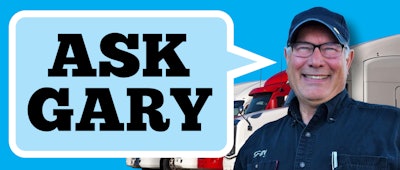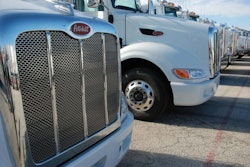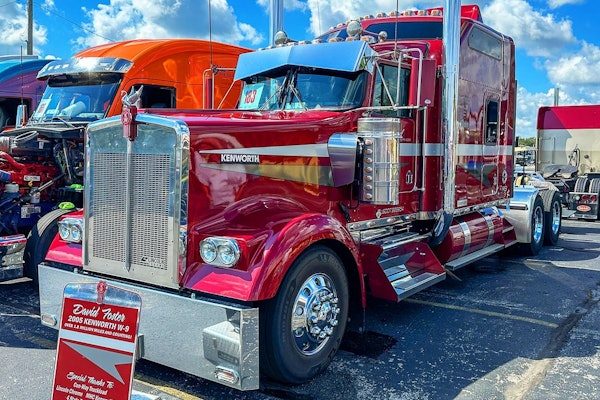 Ask Gary is a new series from Overdrive detailing common financial and business situations owner-operators find themselves in — and, more importantly, how they can navigate toward profitability and success. The advice comes from Gary Buchs, who coaches owner-operators and can be reached at [email protected]. Buchs, a former Owner-Operator of the Year, spent 17 years as an independent contractor at Landstar before retiring in 2019. He also hosts the Truck Business Forum group on Facebook.
Ask Gary is a new series from Overdrive detailing common financial and business situations owner-operators find themselves in — and, more importantly, how they can navigate toward profitability and success. The advice comes from Gary Buchs, who coaches owner-operators and can be reached at [email protected]. Buchs, a former Owner-Operator of the Year, spent 17 years as an independent contractor at Landstar before retiring in 2019. He also hosts the Truck Business Forum group on Facebook.As owner-operators move through a lease-purchase agreement with a carrier, the financial responsibilities can get confusing as circumstances change. In this instance, Gary Buchs tackles the challenge of finding the extra money to complete such a purchase when the operator, already stressed over his cash flow, sees an opportunity to change carriers and improve his business.
The situation:
A 60-year-old owner-operator is paying $1,000 a week for his lease-purchase on a brand-new tractor. Two years into the three-year arrangement, he still owes around $70,000, which is what it would cost him to buy the truck outright from the carrier and terminate the lease-purchase agreement.
The operator wants to take ownership now so that he can sign a more traditional independent contractor agreement with another carrier and, thus, make more money and lower his payment from the $4,000-$5,000 a month he’s paying on it now. He knows the truck isn’t the cheapest equipment out there, but he also knows its history, having maintained it well.
The hang-up is finding the right financing to take on a $70,000 loan to buy out the lease. Banks are generally stubborn on financing equipment for smaller fleets because they’re considered high-risk loans. And when they do issue those loans, they often carry double-digit-plus interest rates.

What’s a lease-purchase operator to do?
Gary’s fix:
A guy called me with this exact situation two years ago. There’s a penalty if he turns the truck in early, and he really wanted to keep the truck. He looked at different financing options, and it was going to be like buying a truck on a credit card — around 18% interest, even from a local bank. He felt smothered by the stress of having little to no income after paying all of his bills — especially the high-cost lease payment.
At his age, he had strong equity in his home and not a lot of other debt. The light debt load enabled him to make that $1,000-a-week payment.
His business had substantial cash flow, but he wasn’t making any money. He did have a 401(k) account from a previous job, and he looked into cashing out some of that to pay for the truck. But that’s not a smart idea, especially for someone at his age.
When he looked into a home equity loan of $70,000, the lender didn’t care what he did with the money. The payments would be around $550 a month. The tradeoff is that he gets the title for his truck, but the lender holds the title on his house until the loan is paid off.
Even though the minimum payment was $550 a month, he said he planned to pay around $1,500 a month on the loan. Combined with insurance, that’s around $2,000 a month for his truck and insurance payment. Before, he was paying right at $5,000 a month for his truck lease payments and his insurance — so he’s taking home about $3,000 more in net income than before, and that’s not counting making extra money from new opportunities.
So a home equity loan worked out for this owner-operator, even though he’ll be repaying the new loan over a longer period than the one year that remained on his lease-purchase debt. He doesn’t feel like his home is at risk because he has other assets and he’s making extra payments on the loan each month. It turned his business around. He said he feels that a weight has been lifted off of him.
He’s been able to make better load selections, with profitability in mind, rather than picking loads just because he had to make his $1,000 weekly payment. And he’s able to drive less.
Don’t assume that a home equity loan is the solution for every financial bind. You need to look at your overall financial picture. Do you already have a lot of payments? Do you have other resources to fall back on?
And how about your equipment? Do you already have a good interest rate? Are you upside down on the equipment? Do you need gap insurance or depreciation coverage? These are all key considerations before choosing to take the route of this owner-operator.
— Gary










